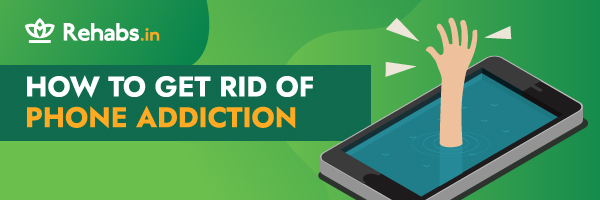How to Get Rid of Phone Addiction

Break free from phone addiction with practical strategies. Learn how to set boundaries, practice mindfulness, and regain control of your digital life for improved well-being.
Understanding Phone Addiction
There are over 3.8 billion smartphone users in the world and phones have become an integral part of our lives. Easy access to such updated technology makes it difficult to put it down and effortless to get addicted. Such smartphone addiction is also known as “Nomophobia” or fear of being without a mobile device.
According to the PEW Research Center, 67% of smartphone owners have admitted to checking their phones for calls or messages when their phones don’t vibrate or ring. This indicates our phone dependency and should serve as a warning to you.
Countless research studies have shown using phones releases dopamine, a chemical in your brain that makes you happy. Therefore, using a phone makes you happy when you receive a notification and in situations where a phone is inaccessible or out of range, it creates feelings of anxiety and depression.
Signs and Symptoms of Phone Addiction
Phone addiction has not been officially recognized by the Diagnostic and Statistical Manual of Mental Disorders, Fifth Edition (DSM-5). But it has been equally compared to gambling which has clearer diagnostic criteria. At least 4 of the mentioned signs and symptoms are thought to be the phone addiction criteria.
- A constant need to use mobile phones often to attain the same desired effect every time.
- Endless failed attempts to control phone addiction.
- Being preoccupied with smartphones.
- Usage of phones to escape the emerging feeling of anxiety or depression.
- Excessive use of phones leads to loss of sense of time.
- Relationship or job has been put at risk due to the extreme usage of cell phone.
- When the phone or network is unreachable, these withdrawal symptoms occur:
- Anger
- Tension
- Depression
- Irritability
- Restlessness
If you or someone you know displays these signs and symptoms, reach out for professional help.
Excessive use of phones can also affect daily life. Here are some signs for you to identify to assess yourself and identify if you have maladaptive behaviours or feelings towards phone addiction:
- Do you feel anxious if your phone is out of service or reach?
- Do you find yourself spending more time on your phone than usual?
- Do you lose sense of time when using a cell phone?
- Did you put a limit to your screen time but failed to succeed?
- Do you feel the usage of your phone decreases your productivity?
- Do you always have a cell phone on the table setting when you eat?
- Do you have an intense urge to respond to every notification you receive?
If you find yourself answering yes to most of the questions, it’s time for you to identify ways to get rid of addiction.
Effects of Phone Addiction
Overusing cell phones can lead to various physical problems that may cause permanent damage. Here are some of the physical effects:
- Eye strain
- Blurred vision
- Neck Problems
- Prolonged illness due to germs
- Life-threatening infections in bones, joints, bloodstream, and lungs.
- Road Accidents
- Infertility
Here are some mental effects:
- Sleep disturbance
- Depression
- Obsessive Compulsive Disorder
- Relationship problems
- Anxiety
Engaging in online activities may seem like socializing however, it only increases your tendency to be lonely. A 2014 study found users, especially teens had contrary feelings towards their social media friends indicating feelings of loneliness and depression.
Another UK-based study found people who endlessly post selfies and write down their thoughts or details about their lives display negative personality traits like Narcissism.
MIT professor Sherry Turkle cites another scientific finding: Over the past 20 years, our society has seen a 40% decline (most of it occurring over the past decade) in indicators of empathy in people, and researchers are linking this trend with the rise of digital communication technologies.
Strategies to Overcome Phone Addiction
Now that you are aware of addiction, here are three effective strategies to overcome smartphone addiction:
- Digital Detox
Digital detox is a time when you consciously choose not to use your tech devices like phones, TVs, tablets, etc. When you choose to unplug from these devices, it helps you focus on the present, become more productive, and pay more attention to your environment.
- Set Boundaries
Setting boundaries is another way to overcome smartphone addiction. Here are some techniques you could follow:
- Delete apps which consume most of your time.
- Create an awareness of your usage by setting a time limit.
- Get rid of unnecessary notifications which create distraction
- When sleeping, keep your phone out of reach.
- Schedule a time slot when you want to use the phone.
- Consider a social media detox.
- Mindfulness
Instead of controlling or keeping away your phone, you can begin by acknowledging the problem mindfully. Mindfully observe what makes you use a phone or what that urge to use a phone has to say. When an urge arises, take ten deep breaths before you pick up your phone.
Creating a Healthy Phone Use Routine
Using a phone is not all bad but a useful tool for humankind. Let us learn ways to create a healthy routine to use phones.
- Establish Screen-Free Zones
It can be tempting to use a phone after a long day however, establishing a screen-free zone is necessary to be present. A screen-free zone is a tech-free place in your home. These zones allow you to be in the moment- whether it is self-care time or quality time with your family.
- Notifications Management
You need to identify the apps that do not serve their purpose or create a distraction. Once identified, it is time for you to minimise those notifications and only allow those that are important.
- Prioritize Face-to-Face Interaction
Prioritize quality time with yourself and your family during the day. During those times, try to ignite personal connections and understand each other and yourself.
Productive Phone Use
Smartphones may have got you glued to them although there are some ups to using them. Here are some of the apps designed to help you get rid of your cell phone addiction:
- Offtime (iOS, Android) – This app helps users unplug by blocking distracting apps and helps you set your screen time goal.
- BreakfFree (iOS, Android) – It breaks down the information into an easy-to-understand “addiction score.
- Flipd (iOS, Android) – This app takes an aggressive approach by locking your phone for a set time providing no access to apps.
- Forest: Stay Focused (iOS, Android) – This app lets you plant a seed in a forest and the growth of the tree depends on your temptation resistance. This leaves a sense of accomplishment when you don’t touch the phone.
These apps help you manage your time by curbing social media addiction and provide enough time for you to achieve the goals you have set for yourself. The goals that you set though must be SMART goals – Specific, Measurable, Achievable, Realistic, and Time-bound. This would help you achieve a sense of accomplishment.
Seeking Professional Help
You should seek help when phone usage becomes excessive, interferes with your daily activities or has neglected your responsibilities towards your significant other. You may have failed attempts to control your phone usage and feel compelled to look at your phone aimlessly which worsens your mental health. These are evident signs for you to get professional treatment for it. Here are some residential rehabs in India you could reach out to for help:
This premium Centre is based out of Tamil Nadu and Maharashtra. These centres have tailored treatment for a holistic transformation.
They are based out of Maharashtra, Gujarat, Tamil Nadu and Delhi. These centres are patient-focused providing privacy and compassion to everyone.
Personal Stories and Motivation
Here is Raffat Binte Rashid’s success story of overcoming his mobile addiction. For almost half of his day, he sat in a corner of his bed, scrolling, watching, playing games or checking emails on his phone. This severe behaviour caused him cervical spondylolysis.
He was aware of his compulsive behavior yet he spent eight hours a day on his phone. It was difficult for him to concentrate on work or pay attention for long durations. He was aloof from his family and kept looking for ways to distract or amuse his mind to keep him happy.
When he consulted his therapist, it surprised him that younger children are equal prey to smartphone addiction. He understood that addiction has harmful effects on cognitive growth and uninstalled all gaming and social media apps from his phone. He recognized two ends to using a phone and one should not be deprived of it but handle it responsibly. He now uses his phone to make phone calls and uses a laptop instead of a phone for work.
Maintaining Progress and Avoiding Relapse
Recovering from addiction is a process of personal growth and you will be prone to relapse. But there are ways to stay afloat and prevent relapse. It takes a strong will and an ongoing effort to fight it. Here are some relapse prevention skills you can learn:
- Self-Compassion
When withdrawal symptoms kick in, insomnia and fatigue are included. Being compassionate towards yourself helps you stay empathetic. Self-care such as a balanced diet and physical exercises could help you.
- Know your Triggers
Identify your internal triggers like irritability, urge to use social media apps, etc. and external triggers like specific places or events.
- Mindfulness meditation
An NCBI study found significant improvement in those people who followed a mindfulness meditation preventing themselves from relapsing.
- Grounding technique
A grounding technique called the 5-4-3-2-1 coping technique can be helpful when stress or anxiety kicks in. In this technique, you need to focus on your five senses to focus on the moment.
Sources:
- 6 apps to stop your smartphone addiction | inc.com. (n.d.). https://www.inc.com/jeremy-goldman/6-apps-to-stop-your-smartphone-addiction.html
- Brzosko, M. (2020, January 28). How to overcome your phone addiction with mindfulness. Medium. https://betterhumans.pub/how-to-overcome-your-phone-addiction-with-mindfulness-a48e2eae72ef
- Kendra Cherry, Mse. (2020, November 20). The benefits of doing a Digital Detox. Verywell Mind. https://www.verywellmind.com/why-and-how-to-do-a-digital-detox-4771321
- Lemonade, T. (n.d.). Why you can’t stop looking at your phone. Lemonade Blog. https://www.lemonade.com/blog/psychology-behind-phone-addiction/#:~:text=Our%20brains%20are%20designed%20to,aroused%2C%20motivated%2C%20and%20happy
- Mobile phone addiction – signs and symptoms. PsychGuides.com. (2023, January 12). https://www.psychguides.com/behavioral-disorders/cell-phone-addiction/signs-and-symptoms/
- Moore, J. D., & Heart, J. (2018, April 26). 7 smartphone boundaries for the digitally addicted. GUY COUNSELING. https://guycounseling.com/smartphone-boundaries/
- Pew Research Center. (2021, April 7). Mobile fact sheet. Pew Research Center: Internet, Science & Tech. https://www.pewresearch.org/internet/fact-sheet/mobile/
- Rashid, R. B. (2023, June 9). The story of My Mobile Phone Addiction. The Daily Star. https://www.thedailystar.net/opinion/views/news/the-story-my-mobile-phone-addiction-3341276
- Robinson, L. (2023a, March 2). Smartphone and internet addiction. HelpGuide.org. https://www.helpguide.org/articles/addictions/smartphone-addiction.htm
- Robinson, L. (2023b, March 2). Smartphone and internet addiction. HelpGuide.org. https://www.helpguide.org/articles/addictions/smartphone-addiction.htm
- Shoukat, S. (2019, February 4). Cell phone addiction and psychological and Physiological Health in Adolescents. EXCLI journal. https://www.ncbi.nlm.nih.gov/pmc/articles/PMC6449671/
- Theresa Parisi, C. (2023, May 18). The top 10 relapse prevention skills. Addiction Center. https://www.addictioncenter.com/community/top-10-relapse-prevention-skills/
- WebMD. (n.d.). What is a digital detox?. WebMD. https://www.webmd.com/balance/what-is-digital-detox
- Zayed, A. A., Author:, Zayed, A., 08-17-2023, L. edited on, MEDICAL REVIEWER: Dr. Harshi Dhingra Clinically reviewed on 08-17-2023, Reviewer:, M., Dr. Harshi Dhingra Clinically reviewed on 08-17-2023, Dhingra, Dr. H., & 08-17-2023, C. reviewed on. (2023, August 17). Phone addiction: Definition, symptoms, risk factor, and treatment. The Diamond Rehab Thailand. https://diamondrehabthailand.com/what-is-phone-addiction/#When_should_we_seek_treatment_for_phone_addiction













